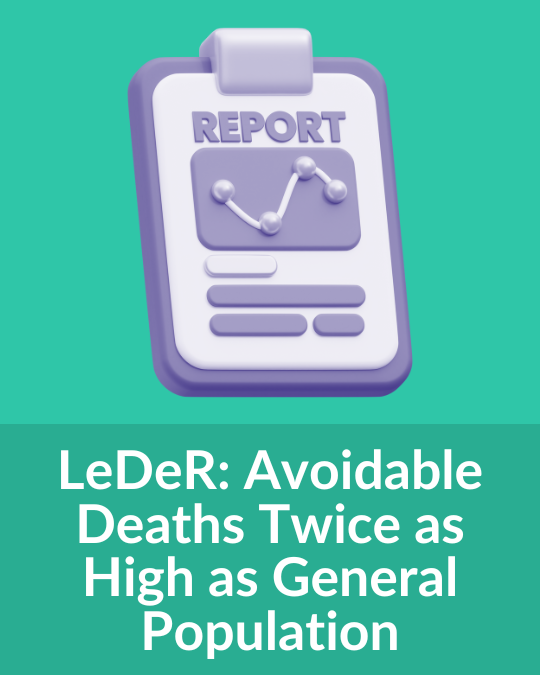Summary:
This blog covers:
- What is the LeDeR report?
- Key statistics from LeDeR 2023
- The importance of care staff training
What is the LeDeR report?
The LeDeR is an annual check on how the UK health and social care sector treats people with learning disabilities and autistic people. It investigates deaths in order to identify areas in need of improvement. This means care organisations can make changes and help prevent further deaths. The 2023 report was presented to Parliament in September 2025. It investigates 3,556 deaths that took place in 2023.
Is the number of avoidable deaths going down?
Yes. In 2021, 46.1% of deaths were reported to be avoidable. In 2023, 38.8% of deaths were avoidable. In comparison, the avoidable death rate in the general population is 21.6%. There is still a long way to go to improve health outcomes for people with learning disabilities and autistic people.
What does the LeDeR tell us about care?
Of the deaths reported to LeDer:
- 37.2% experienced delays in their treatment or care.
- 28.4% received care that didn’t meet expected diagnosis and treatment guidelines.
For autistic people, mental health problems were a leading issue. While some data was collected for autistic adults without a learning disability, more research is needed.
What does the LeDeR tell us about life expectancy?
In comparison to the general population, adults with learning disabilities died an average of 19.5 years younger.
Ethnicity makes a difference, too. Asian and Asian British adults with learning disabilities died an average of 19.8 years younger than White adults with learning disabilities. The median age of death for Asian and Asian adults with a learning disability was 43.2.
This demonstrates that disability and ethnicity can independently contribute to health inequalities, and they can interact to compound inequalities.
What does this mean for training providers?
Training on learning disabilities and autism is absolutely vital for all health and social care staff. In fact, it’s a mandatory requirement for all CQC-registered providers in England.
Several training programmes have been developed in order to meet the statutory requirements. This includes the Oliver McGowan Mandatory Training on Learning Disability and Autism, which is the preferred and recommended route. All training programmes must follow the Oliver McGowan code of practice, which sets the standards for learning disability and autism training in care settings.
Key Takeaways
- The rate of avoidable deaths in people with learning disabilities remains double that of the general population.
- Problems in care include delays, poor adherence to guidelines, and inequality for ethnic minority groups.
- More research is needed to investigate the deaths of autistic people.
- Appropriate training for care staff is essential.
Who are we?
Advantage Accreditation supports care organisations and training providers to deliver outstanding, CPD-approved, accredited training. We accredit centres, trainers, and courses. We can even offer ready-to-use courses to our accredited centres, with topics on health and social care, health and safety, compliance, etc. Please contact us if you are interested in becoming a centre.

